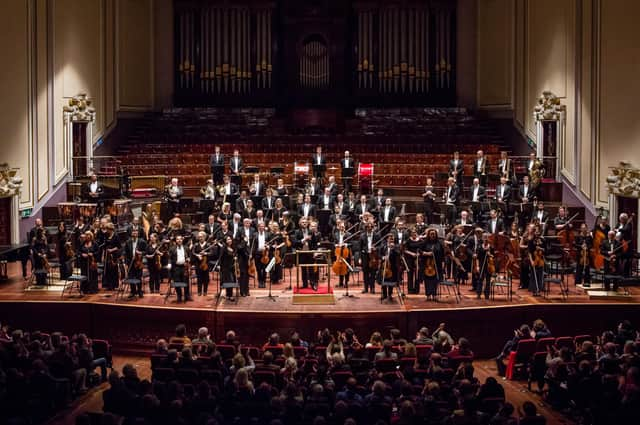RSNO returns to live performance, but paid-for online concerts are here to stay


Autumn means new seasons for the nation’s orchestras, and this year – with a longed-for return to live concerts following 18 months of online performances – those new seasons are more hotly anticipated than ever. There’s excitement, certainly, but also trepidation, with rising Covid numbers and a feared autumn/winter spike. And perhaps not surprisingly, Scotland’s three big orchestras are approaching their respective returns to live shows in rather different ways.
For the BBC Scottish Symphony Orchestra, it’s virtually business as usual, with a season of nine live concerts in Glasgow and Edinburgh. The Scottish Chamber Orchestra is continuing with several free-to-watch, online-only events (and you really shouldn’t miss the first, Julia Wolfe’s spectacular body percussion concerto riSE and fLY with Colin Currie, on 29 September) among its 11 live concerts.
Advertisement
Hide AdAdvertisement
Hide AdThe Royal Scottish National Orchestra, however, has really embraced the lessons it’s learnt over the past 18 months. Each of its six main season concerts will be performed live in Glasgow and Edinburgh, with each Glasgow concert live-streamed online, and also available on demand until the end of January 2022. The season begins on 3 October with Haydn’s Creation, reuniting the RSNO and RSNO Chorus under chorus director Gregory Batsleer. Though not livestreamed, the concert will nonetheless be recorded and available to watch online during the COP26 Climate Change Conference in November.
When we spoke about his pandemic plans last summer, RSNO chief executive Alistair Mackie (who took over the role in April 2019) was determined to see the Covid restrictions as opportunities. That determination hasn’t dimmed. “Something I pushed hard for in my interview for the job was digital engagement. During lockdown we decided not to bring in outside teams to record us. We employed our own people, and we have them on the staff now: a cameraman, a sound engineer and three interns, plus a group of skilled freelancers who are very comfortable with our equipment and our processes. We now have the skills within the organisation to do what we want to do.”
And what the orchestra wants to do now is clearly built on its earlier decision to present paid-for online seasons rather than offering concerts for free. “I don’t think I’m betraying anything to say our board was quite divided about that,” admits Mackie. “It became quite a hot discussion: do we want to get maximum reach with free concerts, or do we want to monetise them?” As well as ensuring much-needed revenue for the orchestra, insisting on paid-for online concerts also generated crucial data on how audience members were interacting with the online performances.
Like, for example, where they were watching from. “There was a concentration in the Central Belt, of course,” explains Mackie, “but there were lots of views from other parts of Scotland, and hotspots in the USA and parts of Europe. And there was was a surprising amount of engagement from south of the border in England. We’ve done European and US tours, but I think we should look at the UK too – we should be back in London, Birmingham and Manchester: there’s a lot of interest.”
Mackie is realistic, however, that the high levels of support he saw might not last. “By asking for payment, I think some people did see that as a way of supporting the RSNO. We did see some digital fatigue, but there were also people watching the concerts multiple times.”
None of the three orchestras has announced plans past Christmas, and of course we're still living amid much virus uncertainty. Mackie even wonders whether orchestras launching year-long seasons might become a thing of the past. How does he see the RSNO’s activities looking further ahead? “If I was going to place my bets now, I’d say we’ll probably do about a third of our concerts as broadcast in the future. But we’ll adapt when we see the data from this autumn. We’re still working out what people want from digital. The excitement at the moment, of course, is about the return of live performances.”
For full details of the RSNO’s new season, visit www.rsno.org.uk
A message from the Editor
Advertisement
Hide AdAdvertisement
Hide AdThank you for reading this article. We're more reliant on your support than ever as the shift in consumer habits brought about by coronavirus impacts our advertisers.
If you haven't already, please consider supporting our trusted, fact-checked journalism by taking out a digital subscription at https://www.scotsman.com/subscriptions